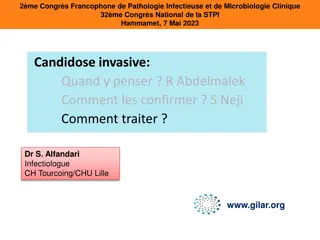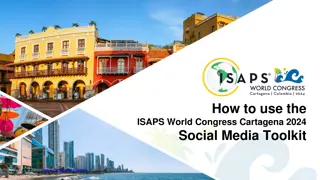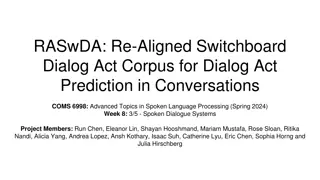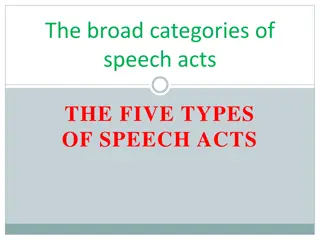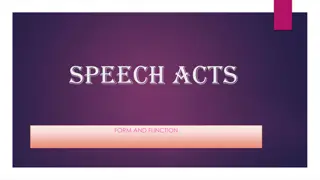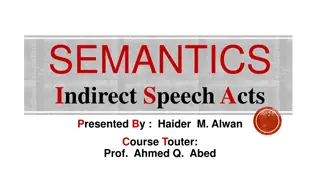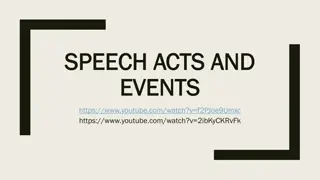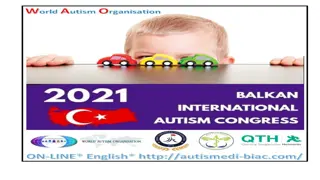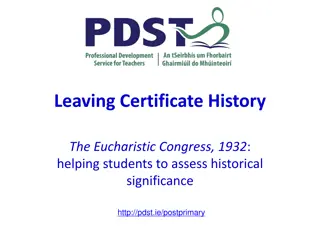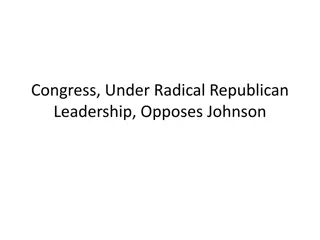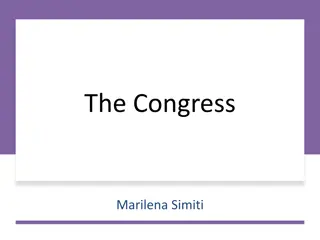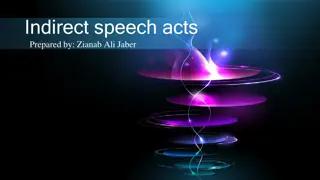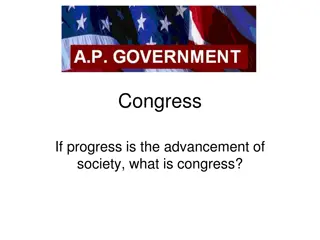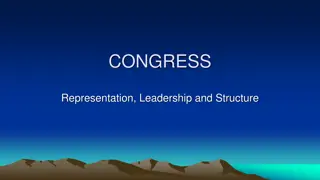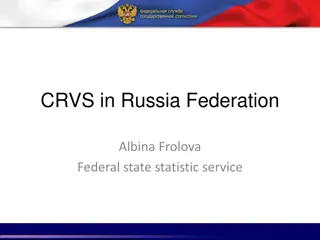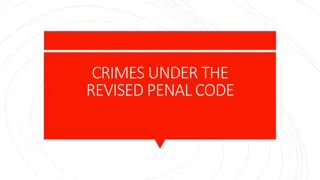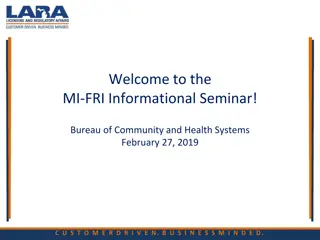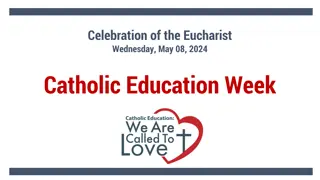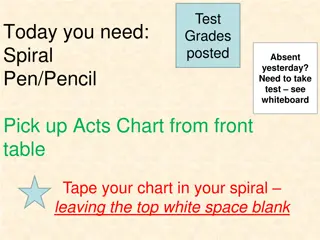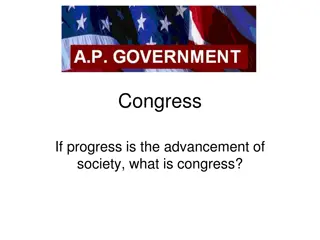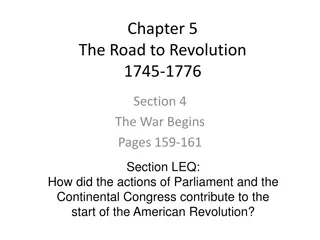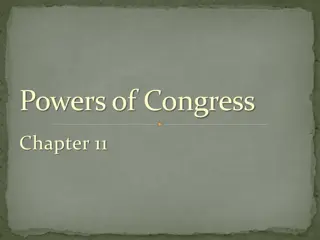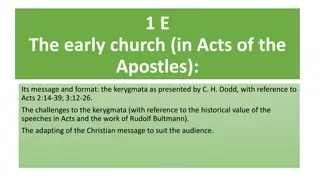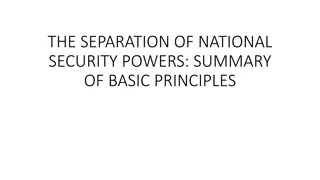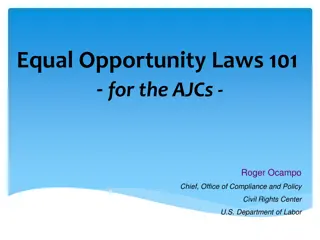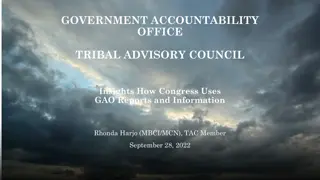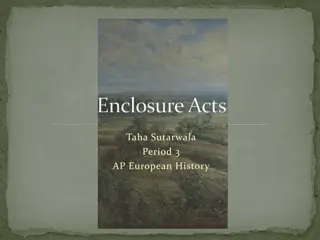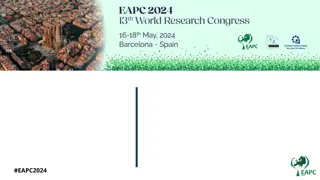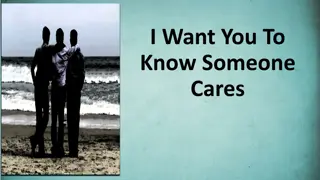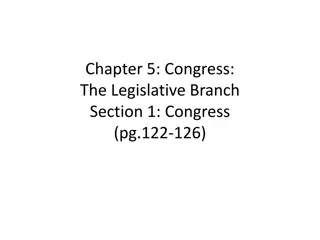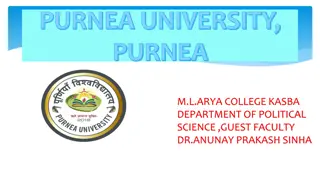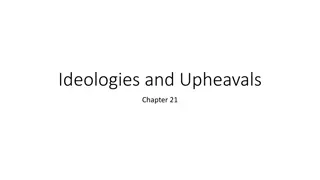Advances in Invasive Candidiasis Management: Insights from the 32nd National Congress in Hammamet
The 32nd National Congress discussed important aspects of invasive candidiasis, including diagnosis, treatment, and mortality rates. Key points included clinical presentations, treatment strategies, and mortality correlations with underlying conditions and time to treatment initiation. Various recom
6 views • 29 slides
Engineering Geology for a Habitable Earth: Presentation at XIV IAGEE Congress
Presenting at the XIV Congress of the International Association for Engineering Geology and the Environment on the topic of Engineering Geology for a Habitable Earth. The presentation covers the background of the project, methodology used, results obtained, and conclusions/recommendations drawn. Tip
7 views • 8 slides
US Congress Seal Wall Plaque
Elevate your space with a distinguished touch \u2013 US Congress Seal Wall Plaque. A symbol of authority and heritage. Explore our collection and order your custom plaque today!
5 views • 1 slides
US Congress Seal Wall Plaque
Elevate your space with a distinguished touch \u2013 US Congress Seal Wall Plaque. A symbol of authority and heritage. Explore our collection and order your custom plaque today!
1 views • 1 slides
Maximizing Social Media Engagement for ISAPS World Congress Cartagena 2024
Discover ways to promote the ISAPS World Congress 2024 effectively on social media platforms such as Facebook, Twitter, Instagram, YouTube, and LinkedIn. Enhance your engagement by personalizing your account with cover images, photo frames, GIFs, and logo images available for download. Join the glob
0 views • 6 slides
Understanding Dialog Acts in Spoken Language Processing
Dialog acts encompass the communicative function and semantic content in conversations, influencing cognitive states and context. They have multiple realizations and interpretations, impacting dialog systems' language generation and recognition processes. Dialog acts play a crucial role in spoken di
0 views • 16 slides
The Five Categories of Speech Acts Explained
Speech acts are divided into five categories: Verdicatives, Exercitives, Commisives, Behavitives, and Expositives. Verdicatives involve giving a verdict, Exercitives give a decision on a course of action, Commisives involve committing to an obligation, Behavitives are used in communication activitie
1 views • 10 slides
Understanding Speech Acts and Politeness in Linguistics
This informative content explores the concepts of speech acts, including direct and indirect speech acts, and the role of politeness in communication. It highlights how speakers convey intentions through their utterances, distinguishing between different speech acts such as requesting, commanding, a
1 views • 11 slides
Understanding Indirect Speech Acts in Semantics
Speech acts can be direct or indirect, with indirect speech acts relying on implicature rather than literal meaning. This concept can lead to confusion, especially in cross-cultural communication. Explore the theories of J.L. Austin and John Searle regarding speech acts and performative utterances,
2 views • 16 slides
Understanding Speech Acts and Events in Communication
Speech acts and events play a crucial role in communication by impacting how utterances are interpreted. Speech acts such as apologies, compliments, complaints, and invitations are performed through utterances, with the locutionary act producing linguistic expression, illocutionary act conveying com
0 views • 30 slides
Balkan International Autism Congress - BIAC2 Summer 2021 in Turkey
The Balkan International Autism Congress - BIAC2 Summer 2021 will be held online via live streaming from Thursday, 01st to Sunday, 04th of July 2021. This congress, organized by World Autism Organisation, features 36 speakers from 17 countries across 4 continents, presenting a range of topics relate
0 views • 5 slides
Exploring the Historical Significance of the Eucharistic Congress, 1932
This resource aims to help students assess the historical significance of the Eucharistic Congress held in 1932. It focuses on fostering critical thinking skills and uses an enquiry-focused approach to clarify learning objectives. The content includes discussion on the context of Ireland and the Cat
0 views • 42 slides
Radical Republican Congress and Reconstruction Efforts
The Radical Republican-led Congress opposed President Johnson's lenient Reconstruction plans after the Civil War. They rejected Lincoln's approach, which led to the implementation of harsh Black Codes in the South. Congress pushed through laws like the Civil Rights Act of 1866 and the Freedman's Bur
0 views • 8 slides
Insights into the Power of the American Congress
The American Congress, established by the Constitution, holds significant power due to its role in overseeing the budget, introducing legislation, confirming nominations, and declaring war. Its authority to tax and spend gives it control over the nation's finances. The presidential system further en
0 views • 75 slides
Understanding Indirect Speech Acts in Communication
Indirect speech acts involve utterances that appear as simple statements but are intended to convey a different meaning such as requests or commands. This form of communication can be seen in various cultural contexts, requiring the listener to interpret the intended illocutionary force behind the w
0 views • 12 slides
Understanding the Role and Structure of Congress in the US Government
Congress, as the legislative branch of the US government, plays a vital role in advancing society by making laws and representing the interests of the American people. Founded with intentions to balance powers and represent states of different sizes, Congress is divided into the House of Representat
0 views • 32 slides
Georgia's Role in the American Revolution
Explore Georgia's involvement in the Revolutionary War period, including its absence in the First Continental Congress, representation in the Second Continental Congress, the role of Georgia's Second Provincial Congress, and the challenges faced during the Revolutionary War fighting in Georgia again
0 views • 10 slides
Understanding the Structure and Challenges of the US Congress
The US Congress, established as the first branch of government, embodies the principle of popular sovereignty. However, challenges such as increasing reliance on deficit spending, failure to pass key legislation, and low public approval due to processes like filibustering have raised questions about
0 views • 20 slides
Civil Registration of Acts in Russia
Civil registration of acts in Russia is governed by key legislation including Federal Law No. 143-FZ and involves the state registration of various events such as birth, marriage, divorce, and death. Bodies responsible for registration are formed by public authorities of the Russian Federation, with
0 views • 24 slides
Understanding Direct Bribery and Public Official Offenses
Bribery of public officials under the Revised Penal Code, specifically Articles 210 to 212, involves direct, indirect, and qualified bribery. Direct bribery encompasses acts where a public officer agrees to perform or abstain from acts in exchange for gifts, promises, or considerations. Offenses inv
0 views • 35 slides
MI-FRI Informational Seminar and MI-ACTS/LTCPP Development Overview
MI-FRI Informational Seminar hosted by the Bureau of Community and Health Systems highlighted the development and improvements of MI-ACTS/LTCPP, aiming to streamline Facility Reported Incidents submissions. The MI-ACTS/MI-FRI workgroup collaborated since 2014 to enhance the system's efficiency and u
0 views • 18 slides
Understanding Communicative Acts on Social Networking Sites
Exploring the taxonomy of communicative acts on social networking sites, this work delves into the impact of design features that influence speech acts, commitment, and normative pressures online. By analyzing common families of communicative acts on SNSs, the research sheds light on how these platf
0 views • 29 slides
Reflections on Catholic Education and Mercy in Light of Acts 17:15-18:1
Today's celebration of the Eucharist focuses on Catholic Education Week and emphasizes the call to love as people of mercy. Reflecting on the Acts of the Apostles passage, we are reminded of God's omnipotence and our identity as His offspring, called to seek and worship Him without idolatry. This se
0 views • 25 slides
Understanding Colonial Acts and Proclamations in Early America
Explore the series of acts and proclamations that shaped the relationship between colonists and the British Empire in early America. Learn about significant events such as the Proclamation of 1763, Navigation Acts, Sugar Act, Quartering Act, and Stamp Act, and understand why these measures sparked a
0 views • 18 slides
Understanding the Role and Function of the U.S. Congress
U.S. Congress plays a crucial role in advancing society by making laws, overseeing the budget, and conducting investigations. This article explores the structure, powers, and leadership of Congress, detailing the differences between the House and Senate and explaining the Constitutional and evolutio
0 views • 31 slides
The Rise of the KKK: Origins, Objectives, and Decline
The Ku Klux Klan (KKK) was founded in Pulaski, Tennessee, in 1865 as a social club for former Confederate soldiers. Over time, it evolved into a terrorist organization with the goal of discouraging black people from holding positions of power and enforcing segregation through fear and violence. Desp
0 views • 13 slides
The Road to Revolution: Actions of Parliament and Continental Congress
The events leading to the American Revolution, including the actions of Parliament and the Continental Congress, are highlighted in this chapter. It covers the issues facing the 2nd Continental Congress, the differences between Patriots and Loyalists, the failure of the Olive Branch Petition, and th
0 views • 21 slides
Powers of Congress: Legislative, Implied, and Congressional Powers Explained
Explore the various powers of Congress, including legislative powers such as enumerated and implied powers, as well as congressional powers like regulating commerce and funding the government through taxes. Discover how Congress exercises authority granted by the Constitution to fulfill its roles an
0 views • 23 slides
Powers of Congress and Constitutional Framework
The powers of Congress in the United States are shaped and limited by two fundamental facts: limited government and a federal system. The Constitution grants Congress powers through expressed, implied, and inherent powers. The Congressional view of power varies between strict constructionists and li
0 views • 25 slides
Early Church Message and Format in Acts of the Apostles: Kerygmata by C. H. Dodd
The early church's message and format in Acts of the Apostles, particularly focusing on the kerygmata as elucidated by C. H. Dodd, with references to Acts 2:14-39 and 3:12-26. Explore the challenges to the kerygmata and the adaptation of the Christian message to various audiences. Additionally, insi
0 views • 17 slides
December Daily Acts of Kindness for the Holiday Season
Spread joy this December by engaging in daily acts of kindness and festive activities. From decorating the Christmas tree to sharing a cup of tea with a loved one, each day offers a unique opportunity to bring cheer and goodwill to those around you. Embrace the spirit of the season with baking, play
0 views • 13 slides
Understanding the Separation of National Security Powers
The separation of national security powers involves the formalist view where Congress makes laws, the Executive executes them, and the courts interpret them. The branches' powers are often blurred, with Congress able to delegate lawmaking power to the Executive. The Executive can also acquire custom
0 views • 8 slides
Understanding Equal Opportunity Laws and Civil Rights Acts
This content covers the importance of enforcing equal opportunity laws and civil rights acts to promote justice and equality in various aspects of society, such as employment, programs receiving financial assistance, public accommodations, and education. It delves into the mission of the Civil Right
0 views • 46 slides
Understanding How Congress Utilizes GAO Reports for Oversight
The Government Accountability Office (GAO) serves as the investigative arm of Congress, supporting its constitutional responsibilities by enhancing federal government performance and accountability. This insight provides a detailed look into how Congress uses GAO reports and information for oversigh
0 views • 13 slides
Impact of Enclosure Acts on European History
Enclosure Acts in the United Kingdom led to the privatization of common land, marking a significant shift in English agriculture and society. Large-scale farmers and aristocrats capitalized on consolidation, leading to the loss of land for small farmers and disruption of the traditional agrarian way
0 views • 22 slides
Conflict of Interest Disclosure for EAPC 2024 Congress
This disclosure statement outlines the conflict of interest policy for speakers at the EAPC 2024 Congress. Speakers are required to disclose any affiliations or financial interests that may potentially influence their presentations. The purpose of the disclosure is to inform attendees so they can ev
0 views • 4 slides
The Power of Friendship: Acts of Kindness and Support
In a world where someone cares, friendship holds immense power. Through acts of kindness, gentle touches, words of encouragement, and unwavering support, true friends demonstrate the essence of companionship. As highlighted in Acts 9:1-19 and John 15:15, the transition from servants to friends signi
0 views • 10 slides
Understanding Congress: The Legislative Branch in Action
The legislative branch is embodied in Congress, where representatives elected by the people translate popular will into law. With the House of Representatives and the Senate comprising Congress, discussions explore the dynamics of representation, member demographics, apportionment, and the distinct
0 views • 11 slides
Overview of the United States Congress and Political System
The United States Congress is the bicameral legislature of the federal government, composed of the House of Representatives and the Senate. Representatives are elected every two years based on districts, while senators serve six-year terms elected at-large in their states. Congress consists of 535 m
0 views • 6 slides
Ideologies and Upheavals: Congress of Vienna and Impact
The Congress of Vienna, a gathering of key European powers, aimed to establish lasting peace after Napoleon's defeat. Key agreements included territorial compensation, restoration of monarchs, and the formation of the Holy Alliance. While successful in preventing major wars, the Congress lacked fore
0 views • 19 slides
